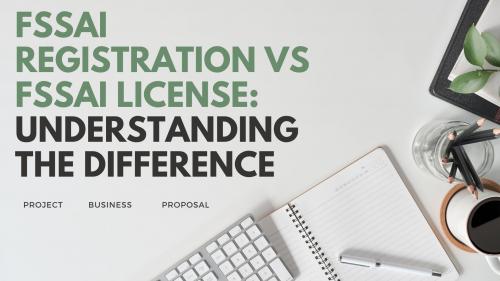FSSAI Registration vs. FSSAI License: Understanding the Difference

FSSAI (Food Safety and
Standards Authority of India) is an autonomous body established under the
Ministry of Health and Family Welfare, Government of India. It is responsible
for regulating and supervising food safety and standards across the country.
FSSAI registration and FSSAI license are two important requirements for food
businesses in India. While both are necessary for compliance, there are key
differences between the two.
FSSAI Registration:
FSSAI registration is the
basic requirement for small food businesses. It is applicable to businesses
with an annual turnover of up to Rs. 12 lakh. Here are the key points to understand
about FSSAI registration:
- Scope: FSSAI registration covers small food businesses such as petty retailers, small-scale manufacturers, hawkers, and food stalls.
- Application Process: The application for FSSAI registration can be done online or offline. It involves submitting the necessary documents, such as identity proof, address proof, and proof of turnover.
- Validity: FSSAI registration is valid for a period of 1 to 5 years, depending on the chosen duration.
- Display of License: Food businesses with FSSAI registration need to display the registration certificate at their premises.
FSSAI license is a more
comprehensive requirement for medium to large food businesses. It is applicable
to businesses with an annual turnover of more than Rs. 12 lakh. Here are the
key points to understand about FSSAI license:
- Scope: FSSAI license covers medium to large food businesses, including manufacturers, processors, transporters, and importers.
- Types of Licenses: There are three types of FSSAI licenses: State License, Central License, and Registration Exemption.
- State License: It is required for businesses operating within one state.
- Central License: It is required for businesses operating in multiple states or having an annual turnover exceeding Rs. 20 crore.
- Registration Exemption: Certain small-scale food businesses may be exempted from obtaining an FSSAI license and can operate with a registration.
- Application Process: The application for an FSSAI license is more detailed and requires additional documents, such as a food safety management plan, NOC from the municipality, and product testing reports.
- Validity: FSSAI license is valid for 1 to 5 years, depending on the chosen duration.
- Compliance Requirements: FSSAI license holders need to comply with more stringent requirements, such as maintaining records of raw materials, maintaining food safety management systems, and regularly undergoing inspections.
·
Post Your Ad Here

Comments